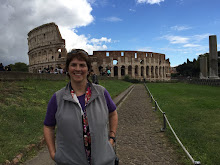Forward 14 years, and I'm thinking of what topic I can talk about for my first book talk of 2017. I usually read non-fiction books that have a medical aspect to them for my book talks at my hospital, and this time I thought I'd try a fiction novel with a medical element. Moloka'i came to mind immediately. Aha! Now I had a reason to read it. It was just the historical fiction novel I needed to read in January.
Moloka'i takes place in Hawaii from 1891 through 1970. It's a historical span that saw Hawaii move from a sovereign country ruled by a king, to a piece of American territory, to finally, the 50th and final state in the United States. All of this is background to the tale of Rachel Kalama, a seven year old Hawaiian girl who lives with her family in Honolulu. Her father is a merchant seaman, and every time he comes home, he brings Rachel a doll from far away lands.
A darkness is starting to creep over Hawaii, and it is leprosy. The native Hawaiians had no immunity to it, and the biblical tales of horrible disfigurement and spread of the disease had people fearful of it and willing to turn friends and family in when it was discovered they had a spot on their skin that was suspicious. Rachel's Uncle is taken away, and her family lives in fear that someone else will catch it. Rachel's mother Dorothy discovers a red patch of skin on Rachel's thigh, and keeps it covered and tells no one. It soon becomes apparent that Rachel may have leprosy as another spot appears on her foot. Dorothy makes her wear shoes to school, and Rachel is unaware of why her mother is so fearful. An argument at school with her sister reveals Rachel's secret, and the inspector comes for Rachel. Taken away to a medical facility, she is looked over and put under isolation, away from her family and friends. Distraught--remember, she's only seven years old--Rachel's behavior becomes a problem, and her parents are notified that she will be taken to Kalaupapa, on the island of Moloka'i. It's a leprosy settlement, where people are taken to live out the remainder of their lives. These are people who never see their families again, aren't allowed to leave the island, and live under terrible conditions. No one knows how to fight leprosy, so they are left to slowly succumb to the horrible afflictions the disease imposes.
What follows is the tale of Rachel's life on Moloka'i as she adjusts to living without her family or friends, and living with the fear of what leprosy will do to her one day. Nuns also live on Moloka'i, running a boarding home for young girls (the boys have a separate home), and working tirelessly to provide some comfort and spiritual guidance to the many who are forced to live in Kalaupapa.
I've never read much about Hawaiian history, and this was fascinating. You can actually travel to Moloka'i and visit Kalaupapa. It wasn't until the late 20th century that people were no longer stigmatized by leprosy and allowed to leave Moloka'i. Now called Hansen's disease, it is curable and almost wiped out. Rachel's story is one of immense sadness, with hints of joy and beauty in the people she comes to know and love, and in Rachel's ability to adjust to a new world without her family. It's painful to think children were taken away from their families, never to see them again. But it did happen. Even in paradise, darkness lurks. Alan Brennert did his research, and his writing is such that you quickly become immersed in the story and it's hard to put down.
I was happily surprised at this novel, and loved reading about Hawaii's history and legends. I also learned a lot about leprosy, and how terribly people were treated through ignorance and a complete faith in outdated beliefs. Rachel was an amazing young woman, who persevered through tragedy with the hope that one day she would be free to leave Moloka'i. I won't tell you what happens, so you'll just have to read the book!
Rating: 8/10 for a well researched historical novel about 20th century Hawaii, leprosy, and an amazing young woman who never gave up.
Available in paperback and e-book.



No comments :
Post a Comment